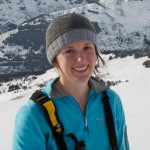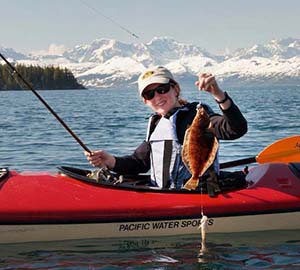Volunteer Spotlight

Sarah Allan, newest member of the council’s Scientific Advisory Committee, known as SAC, has been fascinated by science and the natural world from a young age.
Allan was born and raised in the tiny Southeast Alaska community of Thorne Bay on Prince of Wales Island.
“I was always interested in science from a really young age, my folks were both high school science teachers, so I was exposed to a lot of science,” she says. “There’s a mentality that lends itself to science, that wanting to know the why and how of things.”
“Understanding the why and how actually makes things that much more interesting and fascinating.”
The influence of oil spills
Because the small coastal community was so close to the natural environment, 1989’s oil spill in Prince William Sound was a major topic of conversation in the town. The images of the oiled wildlife were quite memorable and scary from a child’s perspective. She says these memories were part of what influenced her choice of career later on.
Allan’s undergraduate degree and Master’s degree from the Universidad Catolica del Norte in Chile were both in marine biology. Though she focused on the marine environment in her early studies, her interests turned to environmental chemistry and toxicology for her doctorate at Oregon State University.
In 2010, she was in Oregon, close to finishing her PhD, when another major oil spill occurred.
“As I was getting close to finishing my PhD, the Deepwater Horizon happened,” Allan said. “I had been doing my work on PAHs, or polycyclic aromatic hydrocarbons, which are one of the main toxic chemical classes that’s in oil.”
The university group she was working with thought her sampling methods and expertise would be helpful.
“So we went down to the Gulf of Mexico a week after the wellhead exploded and collected data from sites along the shorelines, all the way from Louisiana to Florida,” Allan said, “That data set that we collected, though relatively limited in scope, is actually one of the very few baseline data sets that we have for the water chemistry piece in the nearshore area.”
Allan now works for the National Oceanic and Atmospheric Administration, as the regional coordinator for the Assessment and Restoration Division, and as an environmental scientist for the Emergency Response Division.
“Most of my work is focused on the Arctic,” Allan says. “I’m trying to get the pieces in place, so that if there were a spill in the Arctic, we would have a plan in place on how to assess injuries to natural resources.”
“Right now, I’m developing guidelines and protocols for going into the field and collecting samples.”
Allan has been looking at guidelines from around the world and trying to find ways to adapt those protocols for the Arctic. She evaluates possible options for restoration. The harsh Arctic environment poses many challenges.
“We’re working with really complicated logistics,” she says. “It’s hard to get into the field, it’s hard to get samples out of the field, temperatures might be an issue, holding times might be an issue.”
Allan says that the Gulf of Mexico spill set a whole new precedent for how oil spills are dealt with in the U.S.
“A lot of the planning I’m doing for the Arctic is based on lessons learned from Deepwater Horizon, new technologies that might be applicable in the Arctic,” she says.
“I’m thinking about what we can do to communicate better with the public about what we’re doing, because there were obviously some communication gaps during Deepwater.”
The value of science education

Along with her scientific work, Allan worked as a bilingual science educator in Chile and Oregon.
“I think it’s really important to have people be scientifically literate,” Allan says. “I don’t think everybody needs to be a scientist, but having the ability to think critically and have a basic understanding of science is really important.”
Her background in science and education also helps her support environmental and social justice causes.
“I think that it is important to have female role models in science for students, for up and coming potential scientists.”
Allan is fluent in Spanish from her time living in Chile.
“It’s given me the opportunity to connect with the Latino communities in this country that I think are dramatically underrepresented, especially in those science and technology career fields.”
Volunteering with the council’s science committee
“Sarah’s provided the committee with additional expertise in environmental chemistry and toxicology, especially in the area of hydrocarbons from crude oil” says Joe Banta, the council’s project manager who works closely with the science committee, “That’s important because the marine resources that residents in the council’s region depend upon for their livelihood can be affected by crude oil, so this is a major area of research for the committee.”
“It’s so easy, working in government to get bogged down in all the non-science stuff that has to get done,” Allan says. “So, getting to sit down with SAC and actually talk science is really fun for me, both personally and professionally.”